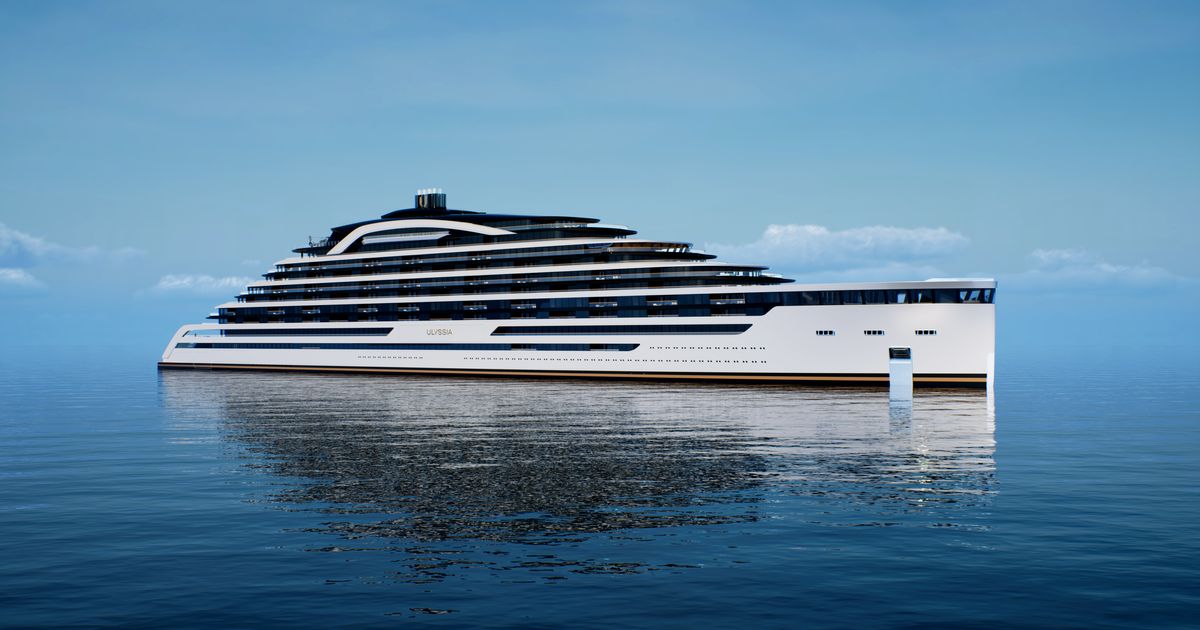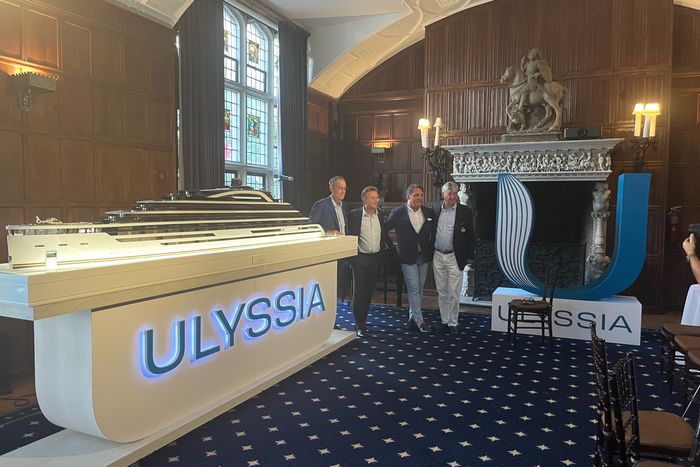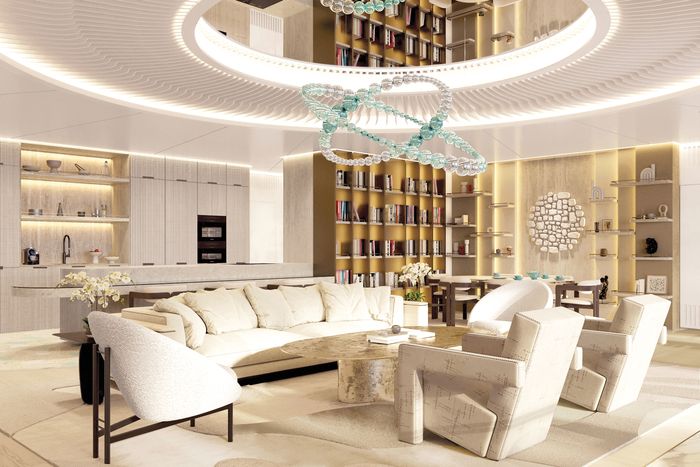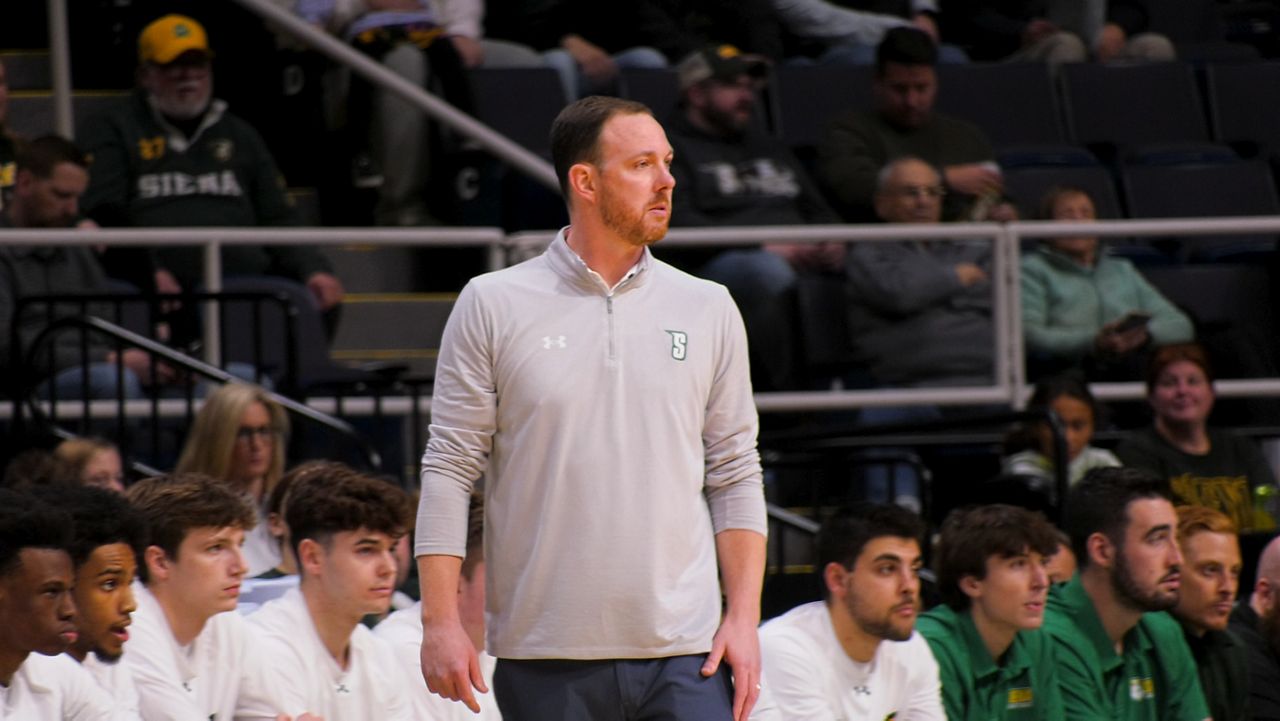World
What Life Might Look Like on the World’s Biggest Yacht

A rendering of the Ulyssia.
Photo: Ulyssia Residences AG
On a Tuesday morning in September, a six-foot-long plastic model of a boat sat on the second floor of the Explorers Club, looking a little like a beached Orca, sleek and out of place in the tweedy boardroom. The tiny yacht had traveled to East 70th Street from Los Angeles and, before that, made stops in Monaco and Zurich, Cannes, and West Palm Beach — a prop to entice buyers who can spend $10 million on a cabin in the world’s biggest yacht. If it gets made. The boat will be called the Ulyssia and it’s the passion project of Frank Binder, a billionaire from the Merck clan with a thing for boats (he once owned a shipyard in Monaco). Lenny Kravitz, his friend, is onboard to help design interiors. (“He’s a genius.”)
Binder has been doing a world tour to find other buyers — who might be hard to meet. Maintenance hovers around 3 percent a year, or $300,000 for that $10 million one-bedroom. It’s a big ask, especially for a boat that, if he does get recruits, won’t launch until 2028. To help, Binder brought on two former executives from the World, the luxury liner that was the first — and only — to prove rich people want to live … at sea, all year. (It launched in 2002, is still sold out, and has yet to snag on an iceberg or go bankrupt.)
Renato Chizzola, a senior vice-president for the Ulyssia who worked as the general manager of the World for five years, spoke to Curbed about the terrors of elephant seals and why he once hired Israeli snipers to come onboard.
This interview has been condensed and edited for clarity.
What did your job on the World look like??
I was in charge of lifestyle, expedition, everything — even the kitchen. You have a captain who’s the master of the vessel, and he ultimately will have the last word on safety, security, where we go, where we can’t go. But then you also need to have somebody who has grown up in a galley carrying luggage. I’m 60 in October. When I was 27, I said, “Okay, how can I see the world without having money?” So in 1993, I was hired on the Queen Elizabeth II, then went to hotels, cruises, and in 46 years I traveled to 186 countries. I was allowed to live onboard and basically extend any service, any dream that a resident had.
Binder, second from left, and Chizzola, second from the right, stand next to the scale model in the Explorers Club.
Photo: Adriane Quinlan
What’s the difference between this superyacht and the World?
The World is now 23 years old. She was created in the late ’80s. She looks like a cruise ship. And the Ulyssia is a yacht — the designer says this is his masterpiece.
We never had many amenities on the World. Here, we have a deli. We have a library with a card and games room. We have a table-tennis room. We have two paddle-tennis courts all inside, a multipurpose sports deck up there where the helicopters are, two hangers, two submarines to go down to the ocean, seven restaurants.
Then, we have this inflatable marina off the back of the boat. Imagine we’re near Bermuda. It’s a beautiful day. The sea is calm. We stop and we inflate this — it takes an hour — and we have tenders. You can go diving right there off the ship. The sea is yours. This marina is something the World could never ever have done, because there’s no space in the boat to keep that. The World was more elderly, a bit elderly retired. This is way younger. Why? Because we have so many amenities and offer adventure. Here, we are offering fewer apartments with more space. The balconies are huge. Luxury, for them, means space, time and getting whatever they wish, whenever, wherever. Freedom.
A rendering of a potential cabin on the boat.
Photo: Ulyssia Residences AG
Freedom, in a contained location —
Yes, and in a safe environment, completely protected against any danger. If a resident says, “I want to bring my family there, I want to be safe, I want to have no worries,” safety needs to be core to us. They want the freedom to do what they do at home — to run around with suits, jewelry. And if they are smart enough to say, “I want to go and see real scenarios, not luxury hotels,” they can go places where there’s no luxury and see how the world really works. That’s what this community wants.
Sounds like a security nightmare.
We will hire ex-Mossad physically, to be on the ship. On the World, we partnered with Marine Guard, one of the world’s best safety and security companies. It provides technical and physical support. And whenever we went to critical places — for example, when we went through the Gulf of Aden, I brought in Israeli snipers to come on the boat. Nobody, no pirate on earth can come in past them. Then on shore excursions, we have every form of security that you can imagine. Satellite images. Images underwater, over water. When we went to Antarctica, to the Northwest Passage — meeting with the Inuits, the Aborigines — you need people who know them. You need people who safeguard you. In the Antarctic, you are only allowed to go with Zodiacs to the beaches. You need people who know that, who know the sea lions, the penguins. We bring them onboard — 20 or 25 people who know everything about every area. And when we do expeditions, we bring on EYOS, one of the greatest expedition leaders in the world, which goes to places like the Titanic.
Is this, like the Titanic, experimental in any way?
No, there are similar yachts. But in four years, when she will hopefully leave port, she will be the greenest yacht of this size ever built. And at that time, we may build for whatever is available in terms of fuel, whether it’s methanol or nuclear. There are vessels already going nuclear, military vessels.
But isn’t this all risky?
It’s the opposite. You will see more and more environments like this at sea. Why? Because you can escape anything! If there’s an outbreak in New York, a big virus, you just won’t go there. If there’s a war there, you just don’t go there. If there’s a storm, you don’t go there.
So this will be a way for the global elite, basically, to pay to avoid any problem.
Is it going to be a one percent community? Yes, obviously, but they need to do good around the world, otherwise they cannot come to the community.
Do good?
Imagine the following. We will have a medical center onboard. We have MRI machines. We have a dentistry. Our doctors, when we go to the west coast of Africa, to Senegal, we can have our doctors go out and help. And as we go around the world, we will help to map the ocean floor. We’ll have tools available to measure and send these to oceanic institutions that then take this data. So we are helping to make the world a better place. And that’s the legacy.
How are you going to gauge whether the people who want to live here also want to do good?
There’s a very tough background check before being allowed to buy. So can it be that a Colombian drug lord or a Russian weapons dealer comes and says, “Oh, I’m going to take ten?” No, that can’t happen. We’re not a community for people from mainland China who don’t speak English and want to spit around. Or aggressive Russians. We are not a community for sheikhs from any Arab countries. And I have nothing against the Chinese and Russians. I love everybody. I’ve been everywhere. But they just don’t fit here, and they won’t come. We want like-minded golf players, tennis players, joggers, bikers, F1 drivers.
We will have roughly 30 to 35 percent Europeans, 30 to 35 percent North Americans, including from Canada, possibly a few from Mexico City, a few from São Paulo. Then we have about 20 percent from Australia, South Africa, Singapore, Hong Kong, Japan. Then we expect to have about 10 percent of people from all over, we don’t know where. It could be anywhere.
They’ll need a certain amount of money to get into this boat and I assume, therefore, that you can’t be that picky.
No, we can’t. But we try to be. It’s a balance. We meet them three, four, five, six times. We invite them, show them something, then they say, “Oh, I trust these people. I believe in them.” It’s a slow process.
Can a buyer get kicked off?
Oh, absolutely.
What’s the justice system?
There’s a board that’s voted in and we have our chairman on the board. Almost all of the members are people who have either been on yachts, have their own yacht, or have led organizations.
If people have their own yachts, why would they sign up for this?
They might have a beautiful yacht of a hundred meters, but they can’t hire all these education guides, explorers all the time. We have 22 guest suites. Imagine we’re coming to Japan. Blossom season. We bring an ex Japanese prime minister onboard, maybe a three-star Michelin chef. We bring them on, let’s say, three weeks before. And they lecture. We can have experts speak about anything. Volcanoes, health and wellness, food and beverage, politics, archeology.
And they have you, who’s been to 186 countries.
Exactly. So when I do speak to people who want to buy and invite them for lunch or a coffee, they listen because they know, Oh, this guy has been there. You don’t need to tell them something that you think can happen. You can actually tell them a story. When I went to Antarctica the last time, in 2009, on the way back to the Zodiac, I am walking and these big elephant seals — those are the big guys, like three tons and ten feet long — and all of a sudden, out of nowhere, there’s a big sound like MWUGHOWUGH and a big one came up, out of the sand. I stood there frozen. These are moments when you think, Is this really happening to me? How fortunate, how lucky am I to be able to experience moments like this? And all the wealthy people say the same.










